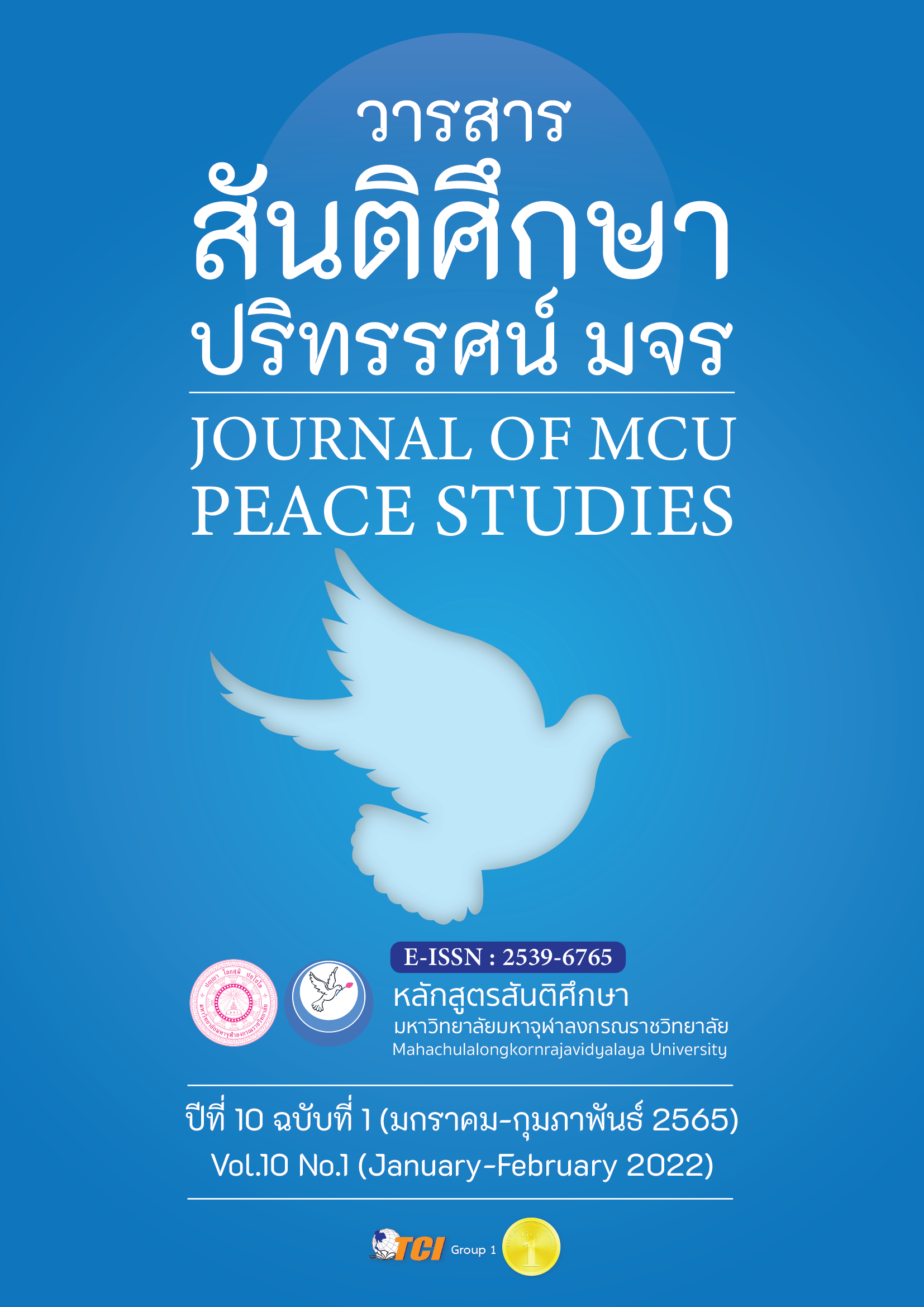การวิเคราะห์เชิงสาเหตุของปัจจัยที่มีผลต่อความสำเร็จของธุรกิจ อุตสาหกรรมการท่องเที่ยวในเขตภาคตะวันออกเฉียงเหนือของประเทศไทย
Main Article Content
บทคัดย่อ
บทความวิจัยนี้ จึงมีวัตถุประสงค์ คือ 1) เพื่อศึกษาความสำคัญของทุนทางสังคม ภาวะความเป็นผู้ประกอบการ ความได้เปรียบในการแข่งขัน นวัตกรรมการบริการ และความสำเร็จของธุรกิจอุตสาหกรรมการท่องเที่ยวในเขตภาคตะวันออกเฉียงเหนือของประเทศไทย และ 2) เพื่อศึกษาปัจจัยเชิงสาเหตุที่มีผลต่อความสำเร็จของธุรกิจอุตสาหกรรมการท่องเที่ยวในเขตภาคตะวันออกเฉียงเหนือของประเทศไทย เป็นการวิจัยเชิงปริมาณ มีวิธีการสุ่มตัวอย่างแบบหลายขั้นตอน โดยกลุ่มตัวอย่างในการวิจัย คือ ผู้ประกอบการธุรกิจอุตสาหกรรมการท่องเที่ยวในเขตภาคตะวันออกเฉียงเหนือ จำนวน 630 ตัวอย่าง ซึ่งใช้แบบสอบถามเป็นเครื่องมือและทำการวิเคราะห์ข้อมูลโดยใช้สถิติเชิงพรรณนา คือ ค่าร้อยละ และใช้สถิติอนุมานในการทดสอบสมมติฐานของการวิจัยด้วยวิธีการสร้างโมเดลสมการโครงสร้าง
ผลการวิจัยพบว่า 1) การศึกษาความสำคัญของทุนทางสังคม ภาวะความเป็นผู้ประกอบการ
ความได้เปรียบในการแข่งขัน นวัตกรรมการบริการ และความสำเร็จของธุรกิจอุตสาหกรรมการท่องเที่ยว
ในเขตภาคตะวันออกเฉียงเหนือของประเทศไทย พบว่า ปัจจัยทุกตัวมีระดับความสำคัญภาพรวมในระดับมาก
2) การศึกษาปัจจัยเชิงสาเหตุที่มีผลต่อความสำเร็จของธุรกิจอุตสาหกรรมการท่องเที่ยวในเขตภาคตะวันออกเฉียงเหนือของประเทศไทย พบว่า ทุนทางสังคมมีอิทธิพลต่อภาวะความเป็นผู้ประกอบการ ความได้เปรียบในการแข่งขัน นวัตกรรมการบริการและความสำเร็จของธุรกิจ ส่วนภาวะความเป็นผู้ประกอบการมีอิทธิพลต่อนวัตกรรมการบริการ ส่วนนวัตกรรมการบริการมีอิทธิพลต่อความได้เปรียบในการแข่งขันและความสำเร็จของธุรกิจ และความได้เปรียบในการแข่งขันอิทธิพลต่อความสำเร็จของธุรกิจ อย่างไรก็ตาม พบว่า ภาวะความเป็นผู้ประกอบการไม่ได้มีอิทธิพลต่อความสำเร็จของธุรกิจและความได้เปรียบในการแข่งขันโดยตรงแต่มีอิทธิพลทางอ้อมต่อความสำเร็จของธุรกิจ ผ่านนวัตกรรมการบริการและความได้เปรียบในการแข่งขัน และโมเดลการวิเคราะห์มีความสอดคล้องกับข้อมูลเชิงประจักษ์ โดยโมเดลมีความเหมาะสมพอดีในเกณฑ์ที่ดี ( = 1565.354, df = 1597, p = 0.709, /df = 0.98, GFI = 0.928, AGFI = 0.910, RMR = 0.024, RMSEA = 0)
Article Details

อนุญาตภายใต้เงื่อนไข Creative Commons Attribution-NonCommercial-NoDerivatives 4.0 International License.
ทัศนะและความคิดเห็นที่ปรากฏในบทความในวารสาร ถือเป็นความรับผิดชอบของผู้เขียนบทความนั้น และไม่ถือเป็นทัศนะและความรับผิดชอบของกองบรรณาธิการ ยินยอมว่าบทความเป็นลิขสิทธิ์ของวารสาร
เอกสารอ้างอิง
Ahmad, N.H., Ramayah, T., Wilson, C., & Kummerow, L. (2010). Is entrepreneurial Competency and Business Success relationship Contigent upon Business Environment?: A Study of Malaysian SMEs. International Journal of Entrepreneurial Behaviour & Research, 16(3), 182- 203.
Bakar, A., & Ahmad, H. (2010). Small Medium Enterprises’ Resources and the Development of Innovation in Malaysia. Journal of Innovation Management in Small & Medium Enterprises, 16(3), 420-435.
Carroll, T. F. (2001). Social capital, local capacity building, and poverty reduction Social Development Papers no. 3. Manila: Asian Development Bank.
Chinchang, P. (2020). Service Innovation Capability and Sustainable Firm Performance: An Empirical Research of Hotel Business in Thailand. Panyapiwat Journal, 12(1), 15-29.
Chitsuchon, S. (2014). Research report Enhancement of economic growth Thailand's longterm: institutional perspective and recommendations. Bangkok: Thailand Development Research Institute.
Chuankroekkun, S., & Laksitmat, P. (2019). Upgrading the Cultural Tourism Market in Sing Buri Province by the Community. Journal of Humanities and Social Sciences Nakhon Phanom University, 9(2), 9-17.
Collins, J. M., & Troilo, M. L. (2015). National factor effects on firm competitiveness and innovation. Competitiveness Review, 25(4), 392-409.
Dustin, G., Bharat, M., & Jitendra, M. (2014). Competitive advantage and motivating innovation. Advances in Management, 7(1), 1-7.
GSB Research. (2019). Report of the top business and industry - at risk for the year 2020. Retrieved April 25, 2020, from https://www.gsbresearch.or.th/wp-content/uploads/2020/01/IN_Sunrise_Overall_63_detail.pdf
Hair, J. F. et al. (2006). Multivariate data analysis (Vol. 6). Pearson Prentice Hall: Upper Saddle River.
Khajeheian, D. (2017). Media Entrepreneurship: A Consensual Definition. AD-Minister, 30(30), 91-113.
Kunene, T. R. (2008). A critical analysis of entrepreneurial and business skills in SMEs in the textile and clothing industry in Johannesburg, South Africa. (Doctoral dissertation). University of Pretoria. Pretoria, South Africa.
Macro Economy, Department. (2020). Thailand's economic direction in 2020 slows below expected and below potential. Retrieved February 28, 2020, from https://www.bot.or.th/Thai/BOTMagazine/Page/Phrasiam_1_63.aspx.
Ministry of Tourism and Sports. (2018). Domestic tourism situation in 2018. Retrieved July 18, 2019, from https://www.mots.go.th/ewt_dl_link.php?nid=1193
Ministry of Tourism and Sports. (2020). Summary of income and tourism expenses from foreign tourists entering Thailand in 2019. Retrieved October 30, 2020, from https://mots.go.th/more_news_new.php?cid=521.
Nunnally, J. C., & Bernstein, I. H. (1994). Psychometric theory. (3rd Ed.). New York: McGraw-Hill.
Office of the National Economic & Social Development Board. (2015). Summary 12 th National Economic and Social Development Plan (2017-2021). Bangkok: Prime Minister's Office.
Petchphongphan, W. (2019). A Causal Model of Factors Influencing Firm Success of Hotel Businesses in Thailand. Panyapiwat Journal, 11(1), 29-39.
Putnam, R. (1993). The Prosperous Community-Social Capital and Public Life. American Prospect, 4(13), 35-42.
Putnam, R. (1995). Bowling alone: America's declining social capital. Journal of Democracy, 6(1), 65-78.
Sattayopas, P., Lertphachin, C., & Techatanminsakul, S. (2014). The Causal Relationship Among Entrepreneurial, Marketing Capabilities, Innovation and Business Strategy toward Competitive Advantage of Small and Medium Enterprises in Lanna of Thailand. Journal of Management Science Chiangrai Rajabhat University, 9(2), 1-23.
Spanos, Y. E., & Lioukas, S. (2001). An examination into the causal logic of rent generation: Contrasting Porter’s competitive strategy framework and the resource-based perspective. Strategic Management Journal, 22(10), 907-934.
Thongmak, S., & Ongkhasing, C. (2017). Social Innovation for Living Standard Improvements of Dual Non-Citizens Living Along the Thai-Myanmar Border, Kanchanaburi Province. Journal of Multidisciplinary in Social Sciences, 13(3), 165-185.
Wingwo̜n, B., Nojthonglek, T., & Phiriyakun, P. (2013). Structural Effect of Business Environment Entrepreneurship and Determinant toward the Family Business Performance in Upper Northern Region of Thailand. Journal of Management Science Chiangrai Rajabhat University, 8(2), 1-35.
Zeebaree, M. R., & Siron, R. B. (2017). The Impact of Entrepreneurial Orientation on Competitive Advantage Moderated by Financing Support in SMEs. International Review of Management and Marketing, 7(1), 43-52.


